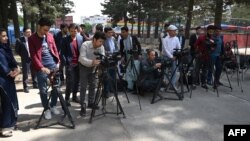A free and independent media will not be possible in Afghanistan, despite assurances from the Taliban, say some journalists at privately owned news outlets.
"A murky future lies ahead for the media in Afghanistan," a former TOLO network journalist told VOA.
The journalist, who left Afghanistan before the takeover and who asked for anonymity, added that "under the Taliban, media would not have the freedom that it enjoyed in the last 20 years."
With the Taliban's return, two decades of gains by Afghan journalists "disappeared overnight," the journalist said.
At the first Taliban news conference on August 17 after the group took Kabul, their spokesperson, Zabiullah Mujahid, said that media will remain "free and independent," provided they work according to "Islamic principles," and are fair and serve "national interests."
But, said the TOLO network journalist, the Taliban "do not define what 'Islamic framework' means for them."
The Taliban's record shows that the group "does not believe in freedom of expression and press," he added.
During their rule in the 1990s, the Taliban did not allow any broadcast media, except state-owned radio channels that were used for propaganda purposes.
Since their return, Taliban fighters have told female journalists at state broadcasters to stop coming into work, conducted door-to-door searches for reporters, and made changes to programming, local media have reported.
Afghan journalist Shakeela Ibrahimkhel told VOA that the Taliban's return "means an end to press freedom in Afghanistan."
Ibrahimkhel was a pioneer in Afghanistan, becoming one of the first female journalists to join independent broadcaster TOLO network in 2004, at a time when it was still unusual for women to be at work.
She worked for the broadcaster for several years. But a Taliban attack on her station changed her life.
In January 2016, a suicide bomber targeted a minivan carrying several of Ibrahimkhel's colleagues. Seven of the station's staff, who had just left work for the day, were killed in the attack.
In an interview earlier this year with VOA, Ibrahimkhel recalled the panic and horror as she started to report on the bombing, only to realize it had targeted her own station.
"All of us, all my colleagues in the office, sat like zombies. We couldn't move," she recalled.
The Taliban claimed the attack and at first claimed Ibrahimkhel was one of those killed, she said.
Fearing for her safety, Ibrahimkhel and her children left Afghanistan a few months later.
The attack is not the only one the Taliban is accused of carrying out against media outlets and journalists in the past 20 years.
Of the 67 journalists killed in Afghanistan between 2013 and 2020, the Taliban is listed as responsible for 27 cases, data from the local media group Afghan Journalists Safety Committee shows.
The Taliban will not allow independent media to work in Afghanistan, said Ibrahimkhel, adding that the group "cannot be trusted to stand by their promises."
She believes that some media outlets will continue in Afghanistan, but they have "to adjust themselves and listen to the Taliban, not only for content but also presentation."
Women journalists would lose their gains because the Taliban "do not believe in women's rights," she added.
Already, women are disappearing from media, says monitoring group Reporters Without Borders (RSF).
Fewer than 100 female journalists are currently working in Kabul, and most of those reporting from the provinces have had to leave their jobs, RSF reported this week. The figure is a significant drop from data the media group collected in 2020.
Afghanistan is facing a media blackout as thousands of journalists flee the Taliban and hundreds of media outlets shut down, said Ibrahimkhel.
In southern Helmand province, which had 16 radio and TV stations before the Taliban's takeover, only five radio stations have resumed, according to one local journalist.
A TV reporter from Helmand said that a combination of a lack of funding and Taliban restrictions have led to media outlets closing. Like many local journalists, the reporter requested that his identity be hidden.
In Kandahar, known as the birthplace of the Taliban, the group ordered radio stations to stop playing music or having female voices on air, Reuters reported.
The Helmand journalist said that the Taliban have also censored media.
"Journalists have to inform and get permission from the Taliban's provincial information and cultural directorate before they start working on the reports," the journalist told VOA.
The restrictions are leading many journalists to think that Taliban rule will be the same as before.
"They think that the Taliban have not changed from the 90s, and they will not be allowed to have their freedoms to work," the Helmand journalist said. "Many journalists are leaving either their profession or the country."
This report originated in VOA's Afghan service.




